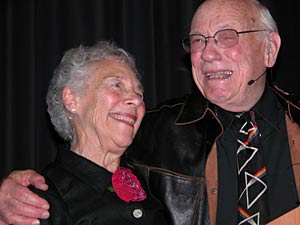UC Berkeley Web Feature
Leon Litwack's last stand
BERKELEY – A high-spirited multi-generational crowd — bearing camera phones, hot-flash hand fans, and balloons scrawled with messages of affection — packed Wheeler Auditorium Monday morning for one last Leon Litwack lecture.
 Rhoda and Leon Litwack (Cathy Cockrell photo) |
"He's got a great narrative style" and a "compelling story," noted Branden Little, a former graduate-student assistant to Professor Litwack among the sea of undergrads, press photographers, family members, former students, and garden-variety well-wishers. Calling the renowned historian "a great shining beacon" and "a consummate showman," the Ph.D. candidate said Litwack "takes a lot of the dryness out of history, that so many students are accustomed to. It's not a mere recitation of facts and figures; it's really a story."
Litwack’s final lecture — embodying both showmanship and storytelling élan – was no exception. With the Isley Brothers' rendition of "Fight the Power" playing in the background, the protagonist entered, stage left, to deafening applause and shouts of "four more years!"
He then quickly got down to the morning's pedagogic business. For the final session of History 7B, "U.S. History Since 1865" (an introductory survey course he has long insisted on teaching), the Pulitzer Prize-winning historian brought the black odyssey in America up to the present. His narrative spanned from the Civil Rights Movement of the 1960s to the late 20th century, when "the crisis moved from the South to the nation,” he declared, and the quest to dismantle an "elaborate system of racial inequality … proved to be far more elusive" than ending legal segregation.
A popular-music fan whose play list includes contemporary rap songs, the 77-year-old scholar illustrated his historical theme — black marginalization and disillusionment in the face of white America’s refusal to "face up to the legacy of slavery"— with examples from the music charts. In the 1960s, Litwack said, the black community’s belief in "America's capacity for change" was soulfully expressed by artists who dubbed themselves the Supremes, the Miracles, the Marvelettes, and the Invincibles. "I know that change is gonna come," crooned singer Sam Cooke. Today, in contrast, names like OutKast, Public Enemy, dead prez, and Body Count, and hard-edged rap lyrics that Litwack liberally quoted, signal a far less optimistic mood.
For those who, as long ago as the '60s, had attended Litwack's history lectures — brought to life by quotations and photos reflecting the experiences of everyman — it was a signature touch.
Those who had come to pay homage to Litwack included history department staffer Ellen Thompson, seated near the front with departmental colleagues, who declared the prof "a great person and great friend." Albany resident Nadine Ghammathe recalled as "an honor and a privilege" her years as Litwack's staff assistant in the 1980s and '90s. "He'd bring his lecture and say 'Can you look this over?' or 'Can you help me choose a title for this lecture?' He engaged everyone in the work he was doing, in a way that you felt you were able to contribute as well, to be valued for your own thoughts and experience by someone like Leon."
Litwack ended with an eagerly anticipated moment of personal reflection. When he first came to Cal as a freshman, he said, "I could not imagine going anywhere else .... There’s an old saying: 'Life is a dream; please don’t wake me up.' That’s how I feel about my life and my years at Berkeley. When I leave here," he told his audience, "I’ll cherish most of all my memories of you. More than 30,000 of you I taught here."
The final words of his 43-year Berkeley teaching career: "Fight the power. Go Bears!" The capacity crowd rose as one to salute the great man as the strains of "Joe Hill" swelled from the sound system.
On March 21, Leon Litwack received the 2007 Golden Apple Award for Outstanding Teaching, given annually to a faculty member by UC Berkeley students. See the NewsCenter's coverage of the award, or watch a webcast of Litwack’s April 17 Golden Apple Award lecture.

